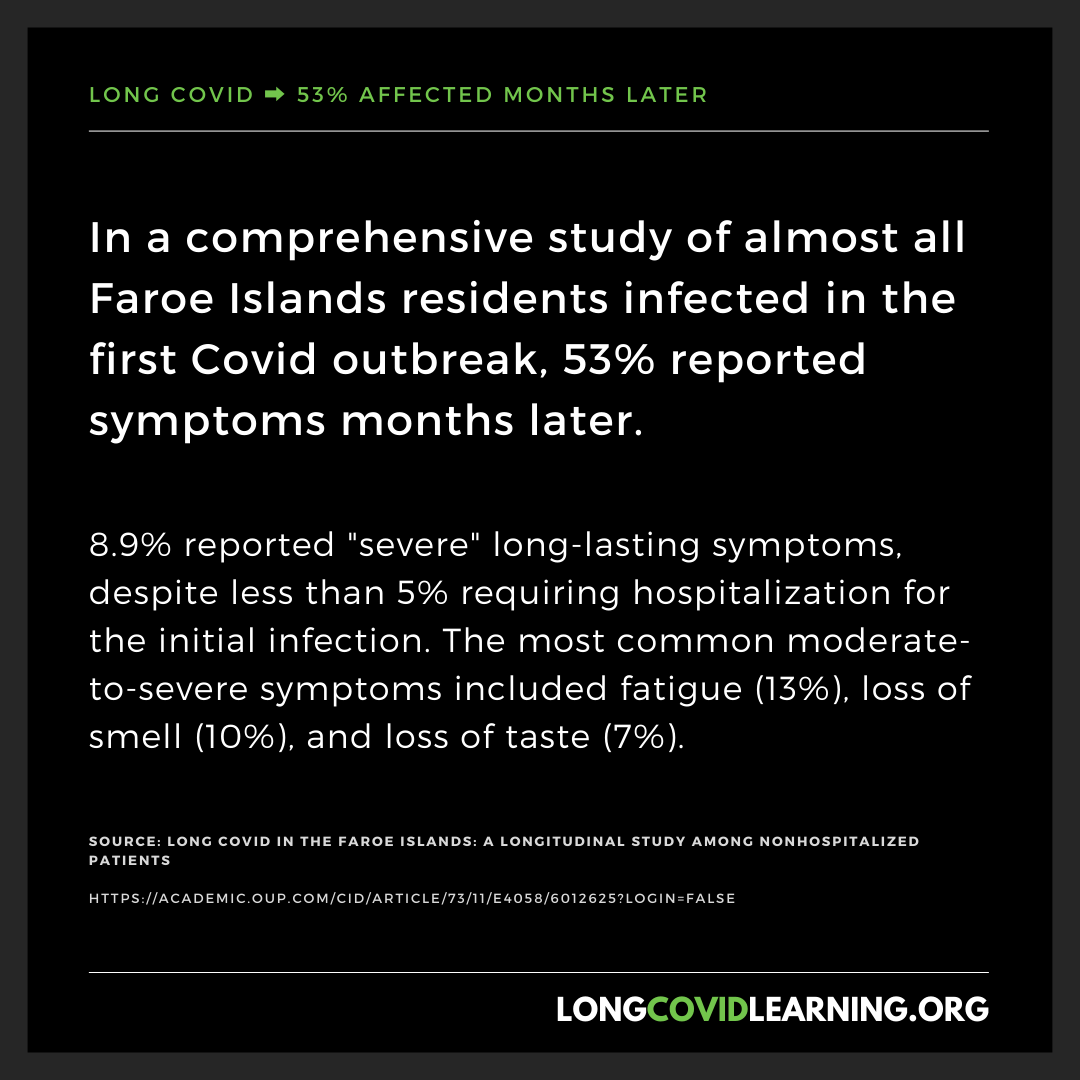
All the research
Long Covid Learning collects research from scientists worldwide and summarizes the findings to make takeaways more accessible to those outside the research community. Study summaries can be shared as links or images in messages and social media.
Visit “The Research” to navigate by topic or to search by keyword.
24 million affected in the U.S.
The U.S. CDC estimates that of the 24 million adults in the U.S. currently suffering from Long Covid, more than 80% are having some trouble carrying out daily activities. 1 in 4 say they are experiencing significant limitations in their activity due to Long Covid. Nearly 30% of all adults previously infected with Covid reported having Long Covid symptoms at some point.
The U.S. CDC estimates that of the 24 million adults in the U.S. currently suffering from Long Covid, more than 80% are having some trouble carrying out daily activities.
1 in 4 say they are experiencing significant limitations in their activity due to Long Covid. Nearly 30% of all adults previously infected with Covid reported having Long Covid symptoms at some point.
Source: Long COVID - Household Pulse Survey - COVID-19 (cdc.gov)
Share the research
Follow us on social media to easily share this study and others with your friends, family, colleagues, and communities. Help us raise awareness of the risk Long Covid poses to us all.
48% affected 6-18 months later
48% of those in a population-level study reported persistent symptoms, impaired daily activities, and reduced health-related quality of life in the 6-18 months after Covid infection across sociodemographic factors and pre-existing health conditions. 1 in 20 had not recovered at all and 1 in 9 had worsening symptoms over the course of the study. Being vaccinated before infection reduced the risk of 7 of the 26 symptoms evaluated by 25-40%.
48% of those in a population-level study reported persistent symptoms, impaired daily activities, and reduced health-related quality of life in the 6-18 months after Covid infection across sociodemographic factors and pre-existing health conditions.
1 in 20 had not recovered at all and 1 in 9 had worsening symptoms over the course of the study. Being vaccinated before infection reduced the risk of 7 of the 26 symptoms evaluated by 25-40%.
Share the research
Follow us on social media to easily share this study and others with your friends, family, colleagues, and communities. Help us raise awareness of the risk Long Covid poses to us all.
77% affected 12 months later
12 months after mostly mild Covid infections, only 23% were symptom-free. Patients reported significantly reduced physical and mental quality of life from symptoms like reduced exercise capacity (56%), fatigue (53%), breathing problems (38%), and trouble concentrating (40%) and finding words (32%). Researchers also found signs of the immune system attacking healthy cells.
12 months after mostly mild Covid infections, only 23% were symptom-free.
Patients reported significantly reduced physical and mental quality of life from symptoms like reduced exercise capacity (56%), fatigue (53%), breathing problems (38%), and trouble concentrating (40%) and finding words (32%). Researchers also found signs of the immune system attacking healthy cells.
Share the research
Follow us on social media to easily share this study and others with your friends, family, colleagues, and communities. Help us raise awareness of the risk Long Covid poses to us all.
53% affected 6-12 months later
53.1% of those with a confirmed Covid infection reported symptoms like mental and physical exhaustion, sleep problems, and cognitive problems 6-12 months later, as compared to 11.5% of those without a confirmed infection. 1 in 14 patients was newly diagnosed with depression, anxiety, chronic fatigue symptom (CFS), fibromyalgia, or PTSD within the first year after a confirmed Covid infection.
53.1% of those with a confirmed Covid infection reported symptoms like mental and physical exhaustion, sleep problems, and cognitive problems 6-12 months later, as compared to 11.5% of those without a confirmed infection.
1 in 14 patients was newly diagnosed with depression, anxiety, chronic fatigue symptom (CFS), fibromyalgia, or PTSD within the first year after a confirmed Covid infection.
Share the research
Follow us on social media to easily share this study and others with your friends, family, colleagues, and communities. Help us raise awareness of the risk Long Covid poses to us all.
Damage to multiple organs
59% of those with Long Covid — most of whom were not hospitalized at the time of infection — were found to have suffered organ damage (spanning heart, lungs, kidneys, liver, pancreas, and spleen) in a longitudinal and prospective study. Organ impairment and symptoms like fatigue, breathlessness and cognitive dysfunction continued to have high prevalence after 12 months, with significant impact on quality-of-life.
59% of those with Long Covid — most of whom were not hospitalized at the time of infection — were found to have suffered organ damage (spanning heart, lungs, kidneys, liver, pancreas, and spleen) in a longitudinal and prospective study.
Organ impairment and symptoms like fatigue, breathlessness and cognitive dysfunction continued to have high prevalence after 12 months, with significant impact on quality-of-life.
Source: Multi-organ impairment and Long COVID: a 1-year prospective, longitudinal cohort study | medRxiv
Share the research
Follow us on social media to easily share this study and others with your friends, family, colleagues, and communities. Help us raise awareness of the risk Long Covid poses to us all.
1 in 4 kids and teens affected
25% of kids and teens with symptomatic Covid later reported Long Covid symptoms, per an analysis of 21 studies. While the studies used a variety of methodologies (yielding a wide range of estimates), the most common symptoms consistently included mood changes (e.g., sadness, tension, anger, depression, and anxiety), fatigue, sleep disorders, headache, respiratory symptoms, congestion, and cognition problems such as difficulty learning and concentrating, confusion, and memory loss. Relative to control groups, those infected were also at higher risk of difficulty breathing, loss of smell and taste, and persistent fever.
25% of kids and teens with symptomatic Covid later reported Long Covid symptoms, per an analysis of 21 studies.
While the studies used a variety of methodologies (yielding a wide range of estimates), the most common symptoms consistently included mood changes (e.g., sadness, tension, anger, depression, and anxiety), fatigue, sleep disorders, headache, respiratory symptoms, congestion, and cognition problems such as difficulty learning and concentrating, confusion, and memory loss. Relative to control groups, those infected were also at higher risk of difficulty breathing, loss of smell and taste, and persistent fever.
Share the research
Follow us on social media to easily share this study and others with your friends, family, colleagues, and communities. Help us raise awareness of the risk Long Covid poses to us all.
Millions unable to work
Of the 16 million working-age Americans currently suffering from Long Covid, 2-4 million are out of work because of their illness, according to analysis by the Brookings Institution based on U.S. Census Bureau data. The annual cost of those lost wages is $170 billion a year, not including reduced productivity from people working while sick, health care costs, or stopping work to care for family.
Of the 16 million working-age Americans currently suffering from Long Covid, 2-4 million are out of work because of their illness, according to analysis by the Brookings Institution based on U.S. Census Bureau data.
The annual cost of those lost wages is $170 billion a year, not including reduced productivity from people working while sick, health care costs, or stopping work to care for family.
Source: New data shows long Covid is keeping as many as 4 million people out of work (brookings.edu)
Share the research
Follow us on social media to easily share this study and others with your friends, family, colleagues, and communities. Help us raise awareness of the risk Long Covid poses to us all.
Symptoms can take 6-9 months
Long Covid symptoms including fatigue, difficulty breathing, difficulty concentrating, and trouble sleeping occur in a large fraction of patients and last over 12 months after the initial infection. The most common symptoms occur in 20-45% of patients. Findings from the 250,000 patients studied suggest that some symptoms become more common over time, first appearing 6-9 months after infection. While there were considerable differences in how the 63 studies analyzed were conducted, Long Covid is now recognized as a complex systemic disease with substantial morbidity.
Long Covid symptoms including fatigue, difficulty breathing, difficulty concentrating, and trouble sleeping occur in a large fraction of patients and last over 12 months after the initial infection. The most common symptoms occur in 20-45% of patients.
Findings from the 250,000 patients studied suggest that some symptoms become more common over time, first appearing 6-9 months after infection. While there were considerable differences in how the 63 studies analyzed were conducted, Long Covid is now recognized as a complex systemic disease with substantial morbidity.
Share the research
Follow us on social media to easily share this study and others with your friends, family, colleagues, and communities. Help us raise awareness of the risk Long Covid poses to us all.
Risk remains after vaccines
Vaccines offer only limited protection against a few Long Covid consequences, reducing risk by less than 30%. The chances of most consequences are reduced only marginally — or not at all. Risks of all Long Covid symptoms together, as well as new cognitive symptoms, heart problems, kidney disease, liver disease, sleep disorders, abnormal breathing, diabetes, obesity, chest pain, joint pain, hypertension, abdominal pain, anxiety, depression, headache, and other symptoms did not differ between those with and without prior vaccination.
Vaccines offer only limited protection against a few Long Covid consequences, reducing risk by less than 30%. The chances of most consequences are reduced only marginally — or not at all.
Risks of all Long Covid symptoms together, as well as new cognitive symptoms, heart problems, kidney disease, liver disease, sleep disorders, abnormal breathing, diabetes, obesity, chest pain, joint pain, hypertension, abdominal pain, anxiety, depression, headache, and other symptoms did not differ between those with and without prior vaccination.
Share the research
Follow us on social media to easily share this study and others with your friends, family, colleagues, and communities. Help us raise awareness of the risk Long Covid poses to us all.
Difficulty and stigma at work
Half (49.5%) of patients with mild Covid still suffered from health problems a month later, including 29% reporting trouble with their performance at work. 43% of those surveyed experienced stigma and discrimination, raising the question of whether it's common for those suffering from Long Covid to hide their illness from colleagues and friends.
Half (49.5%) of patients with mild Covid still suffered from health problems a month later, including 29% reporting trouble with their performance at work.
43% of those surveyed experienced stigma and discrimination, raising the question of whether it's common for those suffering from Long Covid to hide their illness from colleagues and friends.
Source: Long COVID occurrence in COVID-19 survivors | Scientific Reports (nature.com)
Share the research
Follow us on social media to easily share this study and others with your friends, family, colleagues, and communities. Help us raise awareness of the risk Long Covid poses to us all.
53% affected months later
In a comprehensive study of almost all Faroe Islands residents infected in the first Covid outbreak, 53% reported symptoms months later. 8.9% reported "severe" long-lasting symptoms, despite less than 5% requiring hospitalization for the initial infection. The most common moderate-to-severe symptoms included fatigue (13%), loss of smell (10%), and loss of taste (7%).
In a comprehensive study of almost all Faroe Islands residents infected in the first Covid outbreak, 53% reported symptoms months later.
8.9% reported "severe" long-lasting symptoms, despite less than 5% requiring hospitalization for the initial infection. The most common moderate-to-severe symptoms included fatigue (13%), loss of smell (10%), and loss of taste (7%).
Share the research
Follow us on social media to easily share this study and others with your friends, family, colleagues, and communities. Help us raise awareness of the risk Long Covid poses to us all.
54% after 6 months
54% of those infected with Covid still suffered from symptoms such as brain, lung, heart, cognitive, and a variety of other issues (such as fatigue and low tolerance for exercise) over 6 months after the initial infection. This was the conclusion of a systematic review of 57 studies spanning over 250,000 people globally.
54% of those infected with Covid still suffered from symptoms such as brain, lung, heart, cognitive, and a variety of other issues (such as fatigue and low tolerance for exercise) over 6 months after the initial infection
This was the conclusion of a systematic review of 57 studies spanning over 250,000 people globally.
Share the research
Follow us on social media to easily share this study and others with your friends, family, colleagues, and communities. Help us raise awareness of the risk Long Covid poses to us all.




























































